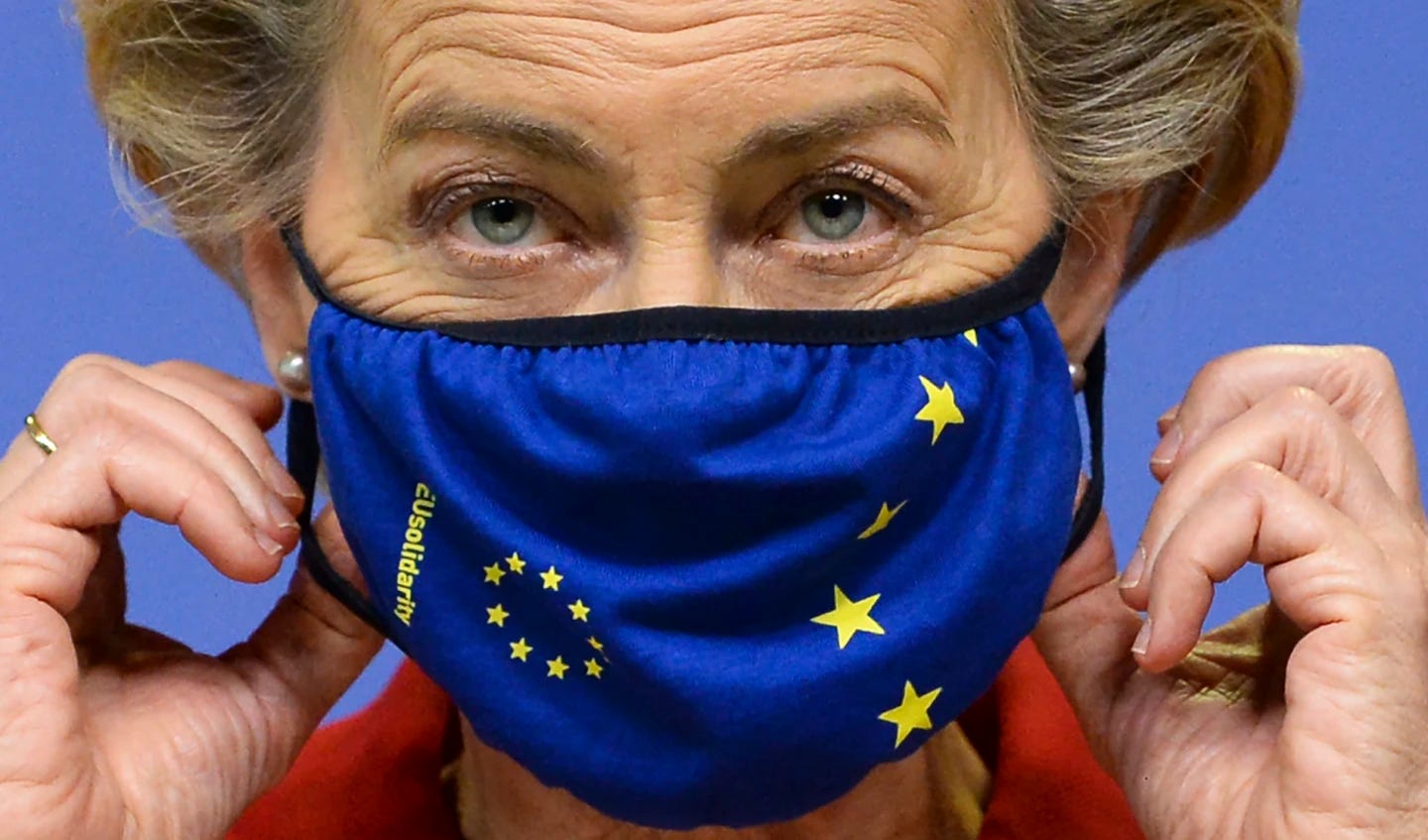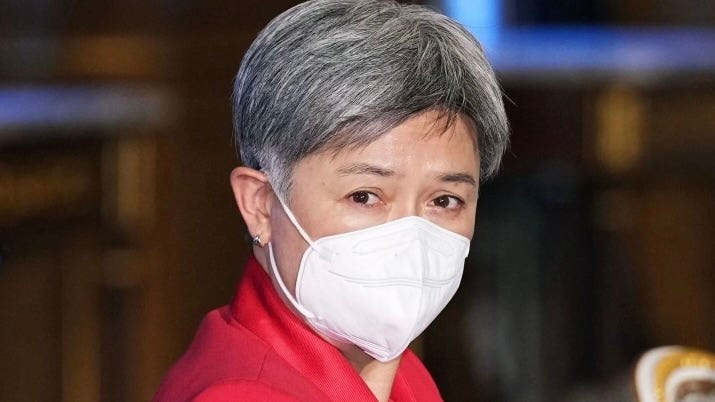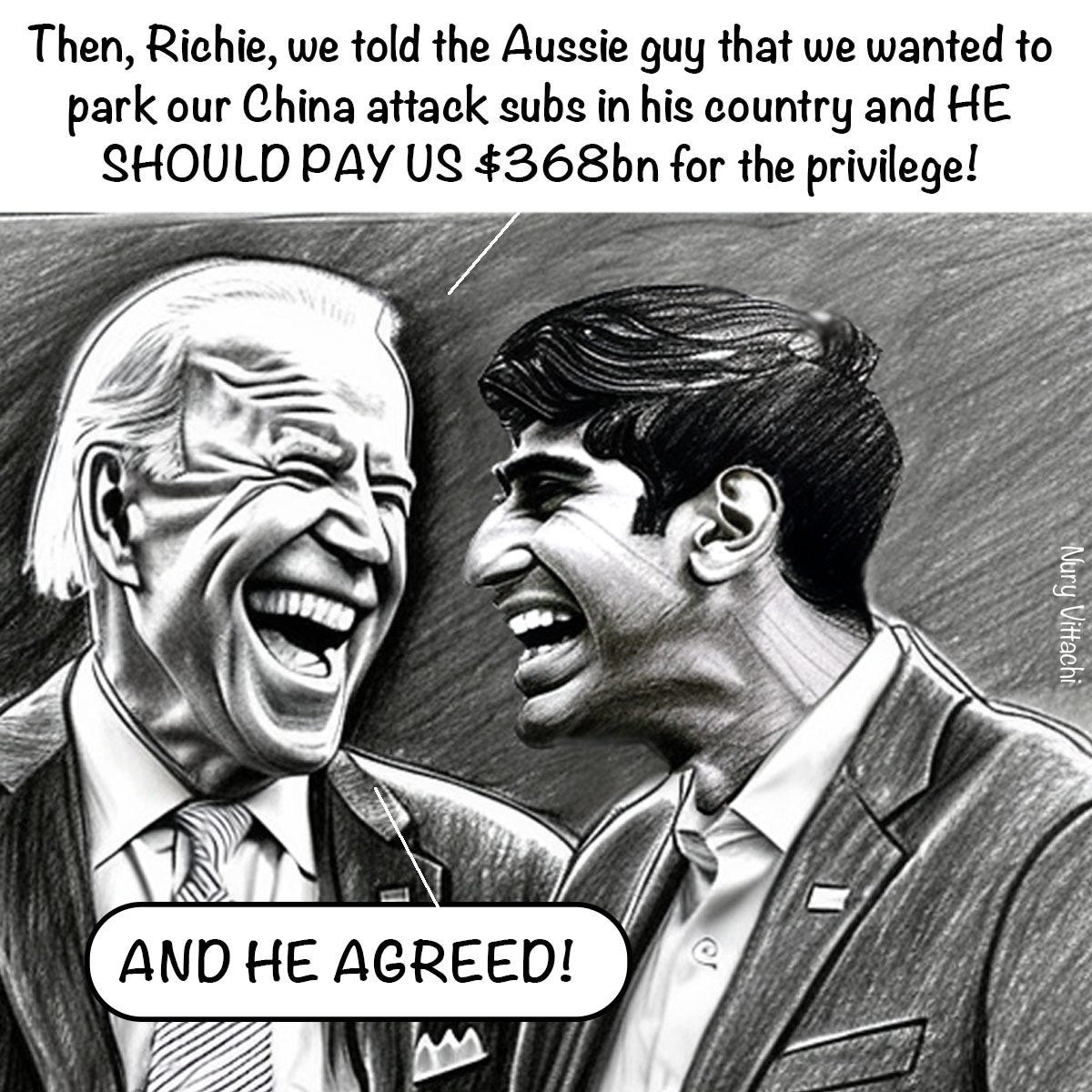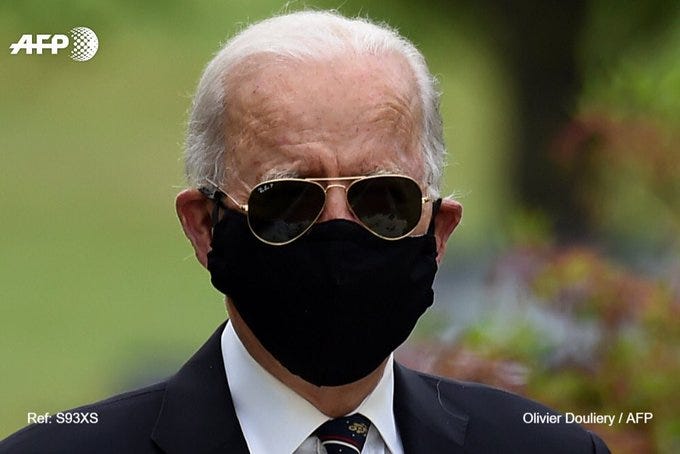Masquerade
Ursula von der Leyen identity disorder, Gen. Milley reality check, Penny Wong wushu, Aukustrated is word of the year, Biden's virtual reality, Sanna Marin exits & right wing enters.
UPDATE: “I want to express my solidarity with you and all the other individuals and institutions who have been unfairly sanctioned by the Chinese government. President Xi told the Communist Party Congress that by 2049 he wanted China to become the world's most powerful nation”. (von der Leyen)
“Ukraine Victory Unlikely This Year […] I'm not saying it can't be done. I'm just saying it's a very difficult task” […] We’re not on the brink of war with China, and Taiwan is not so easy to conquer.” (Gen. Milley)
“It’s fair to say that many countries in the region are unclear about what precisely it is that the United States is seeking to achieve. Absent that clarity, China will assume the worst” (Aust. FM Penny Wong)
Britain’s Oxford Dictionary and America’s Webster’s have moved quickly to shut down further nominations for the 2023 “Word of the Year”. They’ve declared “aukustrate” the unbeatable winner. Unsurprisingly, Australia’s Macquarie Dictionary found no reason to disagree, and fell into line.
Democracy had declined by some measures for 15 consecutive years. We’re creating a new Bureau of Democracy, Human Rights, and Governance at USAID. (Jo Biden)
With 93.4 percent of Finland’s votes counted, Sanna Marin concedes defeat while Petteri Orpo’s right-wing opposition National Coalition has claimed victory.
Ursula von der Leyen on EU-China relations
Excerpts:
I want to express my solidarity with you and all the other individuals and institutions who have been unfairly sanctioned by the Chinese government.
China's reach stretches across all continents and global institutions – and its ambitions are far greater still.
President Xi told the Communist Party Congress that by 2049 he wanted “China to become the world's most powerful nation”.
We have seen a very deliberate hardening of China's overall strategic posture [and] ratcheting up of increasingly assertive actions.
China sees Putin's weakness as a way to increase its leverage over Russia […] the power balance in that relationship – which for most of the last century favoured Russia – has now reversed.
Ukraine will define the terms of a just peace that requires the withdrawal of invading troops. Any peace plan which would in effect consolidate Russian annexations is simply not a viable plan.
[China’s] show of military force in the South China Sea and East China Sea, and at the border with India, directly affect our partners and their legitimate interests. We also underscore the importance of peace and stability in the Taiwan Strait. Any weakening of regional stability in Asia, the fastest-growing region in the world, affects global security, the free flow of trade and our own interests in the region.
The grave human rights violations occurring in Xinjiang are also a cause for great concern.
Just as China has been ramping up its military posture, it has also ramped up its policies of disinformation and economic and trade coercion.
These escalatory actions point to a China that is becoming more repressive at home and more assertive abroad.
The first is that China has now turned the page on the era of ‘reform and opening' and is moving into a new era of security and control.
All companies in China, for example, are already obliged by law to assist state intelligence-gathering operations and to keep it secret.
The imperative for security and control now trumps the logic of free markets and open trade.
The Chinese Communist Party's clear goal is a systemic change of the international order with China at its centre.
China's set of global initiatives and […] how it positions itself as a power and peace broker, for instance through the recent Saudi Arabia and Iran agreement.
I believe it is neither viable – nor in Europe's interest – to decouple from China.
This is why we need to focus on de-risk – not de-couple. And this is part of the reason why I will soon be visiting Beijing together with President Macron.
We do not want to cut economic, societal, political or scientific ties.
China is a vital trading partner – accounting for 9% of our goods exports and more than 20% of our goods imports. While imbalances are growing, most of our trade in goods and services remains mutually beneficial and ‘un-risky'.
We need to reassess the CAI in light of our wider China strategy. Particularly in the context of China's explicit fusion of its military and commercial sectors.
This is why – after de-risking through diplomacy – the second strand of our future China strategy must be economic de-risking.
We rely on one single supplier – China – for 98% of our rare earth supply, 93% of our magnesium and 97% of our lithium. Our demand for these materials will skyrocket […] electric vehicles are forecasted to drive up demand for lithium by 17 times by 2050. We need to strengthen our resilience on cyber and maritime, space and digital, defence and innovation.
This de-risking strategy is better using our existing toolbox of trade instruments to address security concerns, whether on 5G, the Foreign Direct Investment or export controls.
China's changing policies […] define its future relationship in sensitive high-tech areas such as microelectronics, quantum computing, robotics, artificial intelligence, biotech. Where dual-use purposes cannot be excluded or human rights might be implicated […] Europe should develop a targeted instrument on outbound investment to a small number of sensitive technologies where investment can lead to the development of military capabilities that pose risks to national security.
Our economic de-risking strategy is alignment with G7 and G20 partners […] who are thinking on de-risking. We will focus on free trade agreements with New Zealand, Australia, India, our ASEAN and Mercosur partners […] Mexico and Chile. Enhance cooperation on digital and clean tech, with India or the EU-Japan Green Alliance. Invest in infrastructure in the region and beyond through the Global Gateway strategy.
The way the Chinese Communist Party seems to be changing. [We need] a willingness to avoid the divide and conquer tactics […] we may face.
China is a fascinating and complex mix of history, progress and challenges. And it will define this century.
Download full speech here.
Watch full speech here.
Milley on Brink of War
“Ukraine Victory Unlikely This Year […] I'm not saying it can't be done. I'm just saying it's a very difficult task” (Milley, 2023)
We’re not on the “brink of war” with China, and Taiwan is not so easy to conquer, says the top U.S. general. Everyone needs to calm down about war with China, Gen. Mark Milley said on Friday. The Joint Chiefs chairman warned against the rise of “overheated” rhetoric of a looming U.S. war with China, and he said he doubts China’s chances of “conquering” Taiwan. But, he added, the United States should continue to quicken arms shipments to the self-governing nation and its own military capabilities, just in case.
In the last two weeks, members of Congress in hearings aimed a list of concerns about China—everything from nuclear weapons to computer chips, invading Taiwan, and allying with Russia. Milley has taken to telling lawmakers that war with China—and Russia—is “not imminent or inevitable.” It’s part of an effort to lower the heat, he said.
“I think there's a lot of rhetoric in China, and a lot of rhetoric elsewhere, to include the United States, that could create the perception that war is right around the corner or we’re on the brink of war with China,” Milley said in an interview with Defense One.
“And that could happen. I mean, it is possible that you could have an incident or some other trigger event that could lead to uncontrolled escalation. So, it's not impossible. But I don't think at this point I would put it in the likely category,” said Milley. “And I think that the rhetoric itself can overheat the environment.”
Still, Milley said he agrees with calls for the United States to send arms into Taiwan as quickly as possible, to beat China’s Xi Jinping to any punch.
Xi has said he wants the People’s Liberation Army armed and ready to take Taiwan by force, if necessary, by 2027. “So if you think about it, that's only four years away,” Milley said. “So, one of the elements of deterrence is to make sure that your opponent knows that the cost exceeds the benefit. […] My guess is we've got three or four years to get Taiwan in a position where they will create the perception in the minds of the Chinese decision makers that the cost exceeds that.”
Milley said Taiwan needs air defense, anti-ship cruise missiles, and anti-ship mines. But he said the island itself, its population of 23 million—including 170,000 active duty military and 1-to-2 million reserves,—and China’s lack of experience make a takeover unlikely. “It favors the defense. It would be a very difficult island to capture,” he said.
“For the Chinese to conduct an amphibious and airborne operation to seize that island—to actually seize it?—That's a really difficult operation. But Xi put the challenge out there, and we'll see where it goes.”
“We want to have a geostrategic approach that does not drive Russia and China into each other's arms to form an actual military alliance,” he said. “There's some indications that this conversation is ongoing. But that's a whole lot different than actual alliances and military lines.”
In the meantime, Milley said, “I think it's incumbent upon us, the United States, to make sure that we have an incredibly powerful military that is capable,” that China knows it, and that China believes the U.S. will use it if necessary.
Instead of how the China threat is discussed today, he said, “I’d prefer to go back to what Teddy Roosevelt said, which is, you know, ‘speak softly, carry a big stick’ sort of thing. So: Have our military really, really strong [and] lower the rhetoric a little bit with the temperature.”
Milley likes to cite history, and on China he argues that Marxism and determinism points to a foreboding future. “My understanding and my analysis of China is that at least their military, and perhaps others, have come to some sort of conclusion that war with the United States is inevitable. I think that's a very dangerous thing.”
“I don't believe war is inevitable. I don't think it's imminent. But I do think that we need to be very, very pragmatic and cautious going forward. And we will reduce the likelihood of war if we remain really, really strong, relative to China, and China knows that we have the will to use it, if necessary.”
“I just think that it needs to be a little bit more realistic and a little bit less, perhaps, emotional, I suppose. But also on the China side…I just think, for us, the United States, approach this with some steely-eyed, cold-eyed realism. Get the military up to the level of dominance relevant to China, in all the domains. And if they know that, and they know we have a will to use it, then you're probably gonna deter them more from the start.”
Read full article here.
Penny Wong Wushu
Excerpts:
Does the foreign minister believe AUKUS positions Australia for an inevitable Pacific war, or does she still think we needn’t choose between the US and China?
She has two broad options […] One is to pick a side in the contest between the United States and China. The other is to decide what outcome we want from it. The weight of history, habit and our proclaimed values ensure that we could never support China against America, so we must support America against China.
There is no doubt that a US victory in the contest with China, leaving America as the region’s primary power, would be a great outcome for Australia. But America no longer has the overwhelming preponderance of economic and military power that once underpinned its primacy.
It is no surprise that since 2017, when the long-smouldering US–China rivalry burst into flame, Australia has just picked a side. Anthony Albanese has […] gone out of his way […] to proclaim that he is as completely committed to supporting America against China as Morrison was.
In fact, at its heart AUKUS is not primarily about submarines at all. Its fundamental purpose is to strengthen our alignment with America against China. This is clear from the simple fact that there is no other compelling reason for us to seek this capability.
Nuclear-powered submarines do not make strategic or operational sense for Australia.
The government only started making inflated claims to the contrary – that our strategic and operational circumstances had suddenly changed so much that only nuclear subs would do – after AUKUS was announced.
AUKUS will have created the most profound transformation of Australia’s alliance with America since the ANZUS Treaty was signed in 1951. We have been quick to fight alongside America in small, cheap wars such as those in Iraq or Afghanistan, but under ANZUS we have never – even at the height of the Cold War – committed ourselves to support America militarily in a full-scale war against a major, nuclear-armed power.
This first began to shift gradually in 2011, when Julia Gillard welcomed US forces to undertake rotational training deployments through Darwin, but it has accelerated very quickly over the past couple of years, with initiatives such as the provision of operational basing for US long-range nuclear bombers in northern Australia. AUKUS has taken this a huge step further, because it centres around a radically strengthened commitment by Australia to fight alongside America in a major war in Asia.
The old comfortable assumptions about America’s unchallengeable military superiority over China are giving way to more realistic assessments of the balance of military advantage, and the news is not good. No one now expects America to score a swift and easy victory in a maritime war over Taiwan, and only those making heroically optimistic assumptions predict that America would win any kind of victory at all.
The big question about the foreign policy of the Labor government is […] how far she will push her colleagues to look past their loyalty to Washington […] She set out her ideas most clearly in a major speech in Jakarta in late 2019. She described in detail a “compelling chart” in the Turnbull government’s 2017 Foreign Policy White Paper that showed that, as she put it, “within a decade, the Chinese economy is set to become nearly twice as large as the econom[y] of the US”.
She went on to describe the “profound implications for our region and for the United States”, stating: “Over the next decades, neither the United States nor China will be able to exert undisputed primacy. “We recognise that China has a right to develop, and a right to a role in the region alongside other regional powers. We do not and should not pre-emptively frame China only as a threat” […] “this is the first time since European settlement that Australia has had to contemplate living in a region not dominated by a culturally similar ally”.
Australia should seek a multipolar order in Asia, she has said, “a multipolar region in which the United States remains deeply and constructively engaged; in which China is a positive contributor; and in which the perspectives and contributions of smaller powers are respected and valued.” She rejected “the notion of a binary choice: that the only alternatives are accepting a Chinese-led regional order or unconditional support for US-defined strategic competition with Beijing”. The US, she said, should “recognise and embrace the fact that multipolarity in the region is likely to get stronger”. In a remarkable passage, she called on Washington to redefine its objectives, to make it clear that its aim was not simply to contain China and perpetuate American primacy:
It’s fair to say that many countries in the region are unclear about what precisely it is that the United States is seeking to achieve. More questions … need to be asked: What, exactly, is the US competing for? And what might a plausible desired outcome of this competition look like? Absent that clarity, China will assume the worst. It will give fuel to those within the Communist Party of China who believe that the United States wants to thwart China’s rise and contain it.
America’s present policy, she said, “perpetuates the perception that, for Washington, regional engagement is secondary to the US–China relationship and that we all only matter in relation to its competition with China”. And that will not work, she said, because “a strategic competition frame that manifests as ‘you’re either with us or against us’ limits the scope of regional players to make decisions that contribute to the region we want”. And the implications of this for the countries of the region, including Australia, are clear. “We need to do more than establish military deterrents to conflict. We need to work together to create the incentive for dialogue,” she said. Wong welcomed President Biden’s calls for “guardrails” that would help avoid conflict, but she warned of the serious obstacles to that in Washington as well as Beijing. “[T]he kind of international leadership we need to prevent catastrophe must be supported and encouraged across the political systems of both China and America. Heads of government need assurance that nationalistic domestic posturing won’t sink their efforts to build safeguards.”
These days, Wong no longer talks of a multipolar order in Asia. She talks instead of the search for “strategic equilibrium” in the region. Nor will she now talk about Australia’s response to the possibility of war. She will not say what she believes would be at stake for Australia if we are faced with a decision about going to war with China. She will say nothing about the circumstances in which we would be justified in committing ourselves to the conflict. She criticised Dutton for saying that it was inconceivable that we would not fight, but refuses to say whether or not she believes it is conceivable that we would not. Nor will she say anything about whether the AUKUS agreement deepens our commitment to fight, or encourages Americans to assume that Australia would automatically go to war with China if they do.
To even raise the question about whether we’d go to war would cast doubt on whether picking America’s side and accepting the commitments entailed by AUKUS are really the best ways to navigate Asia’s strategic crisis. And it is a debate that, it seems, Penny Wong is uniquely placed to lead. It would be a fight, the biggest fight of her political career, and perhaps bigger than any on our national stage for many decades. It thus presents Wong with a test of her mettle that few of our politicians have faced for a long time. Is she up for it? As yet, that is unclear.
Read full article here.
AUKUSTRATED
Britain’s Oxford Dictionary and America’s Webster’s have moved quickly to shut down further nominations for the 2023 “Word of the Year”. They’ve declared “aukustrate” the unbeatable winner. Unsurprisingly, Australia’s Macquarie Dictionary found no reason to disagree, and fell into line.
The announcement followed the Global Public Relations Institute giving its Marx/Goebbels Award for the Propaganda Campaign of 2023 to the communications strategists behind AUKUS: the astonishingly well “orchestrated/aukustrated” push by northern hemisphere arms makers which commits Australia to spend $12 billion a year for the next 30 years on US/UK submarines.
A spokesperson for the Global PR Institute said the AUKUS/arms-dealers promoters had followed every good rule in the playbook:
Persuade a struggling Liberal/Coalition PM (Scott Morrison) that his electoral prospects would be better served if he reneged on a submarine-supply contract with the inconsequential/hapless French, and switched instead to Australia’s more traditional allies – the US and UK.
Have the Coalition Government advise the Labor Opposition of the decision less than 24 hours before it’s announced publicly, knowing that Labor will go along with it because they’re nervous about being seen as not completely committed to the US alliance (never mind what the ALP’s parliamentary party room and rank and file might have said, if asked).
Then, once Labor is elected….
Prime the best-respected print media outlet in Australia to run a huge series on how China is about to start a war, including an invasion of Australia. For the series, assemble a panel of experts, including some who have clear links to a think tank funded by US interests and the Australian Government.
A week or so later, schedule an exquisitely made-for-TV meeting at a naval base in the US, involving the US President and the UK PM, and Australia’s PM, for the biggest photo-op an Australian PM will ever enjoy on the world stage. Confirm submarines deal, with just enough detail to make it sound credible: “catching the wave of history”.
Endure the inevitable criticism and scepticism, with well-prepared talking points. Switch easily from “This is to stop a Chinese attack on Australia,” to “This is to protect our sea lanes (in the South China Sea) for our export markets”. Include “This doesn’t commit us to be involved in a war over China’s claims to Taiwan”.
Have a recruitment commercial ready to run on TV, a few days after the announcement, seeking people to build and crew the submarines (knowing they’ll be a little hard to find, given the US will veto anyone from the “suss” countries from which we draw many of our immigrants).
The panel also noted the deft handling of potentially tricky issues, as the “aukustrators” successfully silenced:
Any mention that the Port of Darwin is already leased to a Chinese corporation, courtesy of a local Coalition (NT) government unimpeded, at the time, by a federal Coalition government.
Pesky questions about how having a few Australian submarines in the South China Sea would be able to stop China sending long range missiles to nuke the “joint US/Australian surveillance base” at Pine Gap, (near Alice Springs, NT) and Tindal Air Base (near Katherine in the NT): Australian mainland territory, effectively ceded to the US.
Reference to Australia’s disastrous contract to purchase the F15 fighter-bombers from the US, to ensure it’s not used as a negative case history.
Observations on the fact that all of the individuals/parties who lent themselves to this will be long gone (dead or retired) by the time the submarines program is meant to be finalised in the mid 2050s.
The panel noted the particular sophistication of the argument that the subs would be used to patrol the sea lanes around Australia’s largest trading partner, China, while identifying China, itself, as the biggest threat to the security of the very waters through which Australia/China imports/exports are carried.
Read full article here.
Virtual Democracy Summit
Excerpts:
Democracy had declined by some measures for 15 consecutive years.
Here in the United States, we’ve demonstrated that our democracy can still do big things and deliver important progress for working Americans.
We’re bringing down the cost of essentials like prescription drugs and health insurance premiums. We’re rebuilding America’s infrastructure, driving innovation and tackling the climate crisis while — all while creating good union jobs and investing in communities that too often have been left behind in the past.
Angola has taken steps to build an independent judiciary, creating three new region- — three new regional courts of appeal, which are going to help process cases more quickly.
The Dominican Republic has modernized its anti-corruption law to create more than 100 anti-corruption offices
at local levels.
Croatia is implementing a multi-year anti-corruption plan to increase government transparency and better oversee public procurement.
We just heard from two incredible women who made an incredible case regarding Belarus.
Moreover, when we advance equality and racial justice, and invest in young people, protect the LGBTQ+ individuals, our societies are not only fairer but they’re stronger and more successful.
[T]he unprecedented unity we’ve seen from democracies condemning Russia’s brutal war of aggression against Ukraine and standing in solidarity with the brave Ukrainian people as they defend their democracy.
The Presidential Initiative for Democratic Renewal, committed more than $400 million to shore up transparent and accountable governance, support for media freedom, fighting international corruption, stand with democracy and democratic reformers, promote technology that advances democracy, defend elections.
Now, working in close cooperation with the United States Congress, we plan to add another $690 million for new funding for the Presidential Initiative over the next two years.
And over the course of three years, my administration intends to work with Congress to commit $9.5 billion across all our efforts to advance democracy around the world.
We’re creating a new Bureau of Democracy, Human Rights, and Governance at USAID.
One key focus of our democracy work [is] making sure that technologies can continue to develop that are used to advance democratic governance, not used to undermine it.
I signed an executive order […] to restrict the U.S. government’s use of commercial spyware that has been abused to target dissidents, activists, and journalists around the world, including in the United States.
My administration is leading in the digital space for strengthening tools for Internet freedom; to better protecting activists and journalists from cyber threats, harassment, abuse; and shaping emerging technologies like artificial intelligence so that they deliver and develop things that are in line with our values.
[T]he democracies of the world are getting stronger, not weaker. Autocracies of the world are getting weaker, not stronger.
Thanks to the Republic of Korea for stepping forward to host the next Summit for Democracies. I’m now going to turn this over to the President of Slovakia.
I’m proud to stand with all of you to defend […] justice, the rule of law, free speech, assembly, freedom of the press, freedom of religion, and our core belief in the interest of human rights for every single individual in the world.
But with the Republic of Korea hosting the next Summit of Democracy, we’re going to keep going, together, all of us.
Read full speech here.
Finland: PM Marin exit - right wing center stage
With 93.4 percent of votes counted, Marin concedes defeat while Orpo’s party looks set to get the most seats in parliament. Finland’s right-wing opposition National Coalition Party leader Petteri Orpo has claimed victory in the Nordic country’s tightly-fought parliamentary election.
Finland’s Prime Minister Sanna Marin of the ruling Social Democratic Party conceded defeat in the close-fought election for parliament.
With 93.4 percent of the votes counted, Orpo’s party looks set to get the most seats in parliament, 48 out of 200 in total. The party has 20.5 percent support among votes cast, justice ministry election data showed.
With the top three parties expected to each get around 20 percent of the vote, no party is in a position to form a government alone.
“Based on this result, talks over forming a new government in Finland will be initiated under the leadership of the National Coalition Party,” Orpo said as he claimed victory surrounded by supporters.
The National Coalition Party was on top with 20.7 percent, followed closely by the right-wing populist party The Finns with 20.1 percent, while the Social Democratic Party of Marin garnered 19.9 percent.
Marin, 37, is considered by fans around the world as a millennial role model for progressive new leaders, but at home, she has faced criticism for her government’s public spending and for partying.
If the NCP lead holds, Orpo will get the first chance at forming a coalition to obtain a majority in parliament, and Marin’s era as prime minister will likely come to an end.









